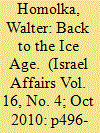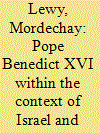| Srl | Item |
| 1 |
ID:
100678


|
|
|
|
|
| Publication |
2010.
|
| Summary/Abstract |
Until well into the twentieth century, Jews and Christians had no mutual basis for discourse. The Christian-Jewish dialogue and the rapprochement between the Holy See and the State of Israel are owed in essence to feelings of shame regarding the Shoah. The Second Vatican Council and the pontificate of John Paul II signified substantial breakthroughs. Since then, though, the sense of guilt has eased, and the Roman Catholic Church's awareness of the injustice of its role as fellow traveller to, and henchman of, the Third Reich has diminished. Under the current Pope, Benedict XVI, the relationship between Jews and Catholics has noticeably deteriorated. After five years of his pontificate, Joseph Ratzinger has lost a great deal of trust, and not only among Jews.
|
|
|
|
|
|
|
|
|
|
|
|
|
|
|
|
| 2 |
ID:
114193


|
|
|
|
|
| Publication |
2012.
|
| Summary/Abstract |
Divorce legislation was enacted in Malta in 2011 following a consultative referendum. Until then the biggest barrier to divorce had been the perceived influence of the Catholic Church, expressed not just in its presence in many spheres of public life, but in historical reminders of the political costs of challenging its status and doctrines. The process leading to the introduction of divorce showed: that the political parties still feared confronting the Church; that the Church itself had been losing ground as a politically coercive or persuasive force; and that the biggest challenge to its status and relevance was coming from below, as a result of people's changing attitudes and lifestyle. This contrasts starkly with the history of Church-State relations and its landmark political-religious conflicts, involving the ecclesiastical establishment on the one hand, and secularising political forces on the other. Retracing the history of political-religious strife, this paper seeks to evaluate the changing quantity and quality of ecclesiastical power in Malta, up to the point when the divorce question exposed its limits, though not its end.
|
|
|
|
|
|
|
|
|
|
|
|
|
|
|
|
| 3 |
ID:
100684


|
|
|
|
|
| Publication |
2010.
|
| Summary/Abstract |
The pontificate of Benedict XVI is undoubtedly shaped by his personality as a profound thinker and one who is much more a philosopher than a politician. Management seems not to be his trade. With his intellectual mind he shuns anything that smells of populism. The mass media has an inherent difficulty in placing him within their traditional parameters. The paradigm of Pope Benedict can serve as a microcosm that reflects the complexity imprinted on relations between Israel and the Holy See. Any effort to simplify those relations according to the vocabulary of conventional bilateral relations may do injustice to their essence.
|
|
|
|
|
|
|
|
|
|
|
|
|
|
|
|